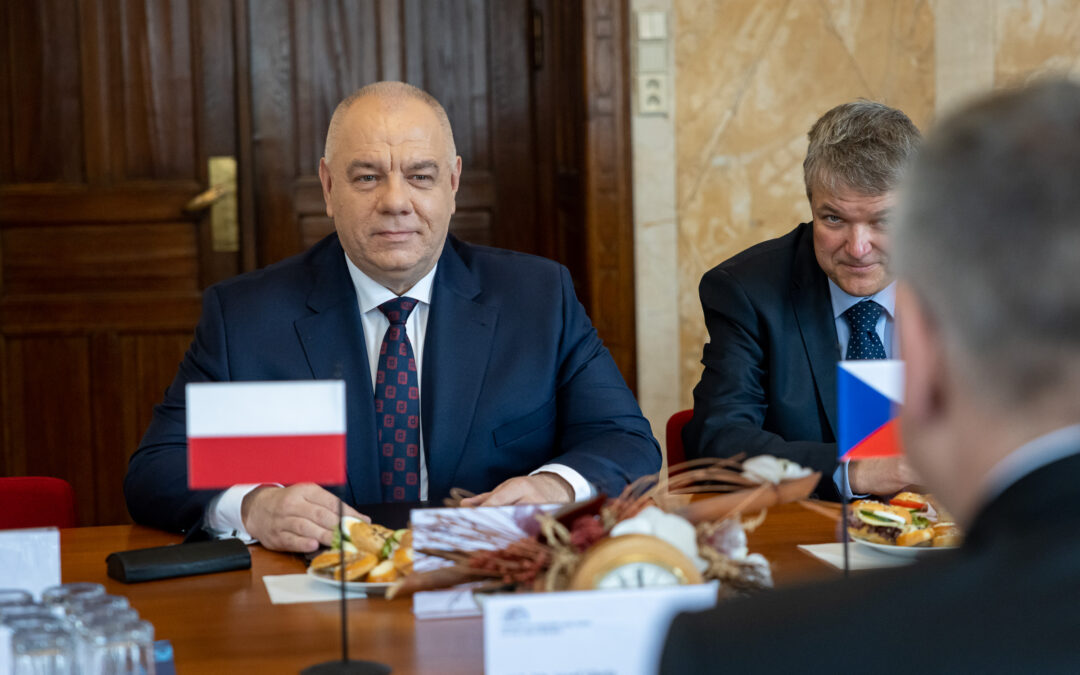Poland says it wants to help the Czech Republic move away from Russian oil but has urged Prague to change its tax law to facilitate more investment in oil company Unipetrol, which is owned by Polish state energy giant Orlen.
Warsaw considers the Czech windfall tax – imposed on companies and sectors that make high profits in a favourable market situation, such as high energy and fuel prices – an obstacle to investing in Orlen-owned refineries in the Czech Republic.
“The Czech government has introduced a very restrictive tax on companies, the windfall tax,” said Poland’s state assets minister, Jacek Sasin, yesterday during a visit to Prague with Daniel Obajtek, Orlen’s CEO, to meet Czech industry minister Jozef Síkela.
“It also affects very strongly Unipetrol, which has huge investment plans and wants to invest in modernising its refinery assets in the Czech Republic,” added Sasin. “Our common goal is the complete elimination of Russian oil in the Czech Republic [as] we have done in Poland.”
💬Wicepremier @SasinJacek w #Praga: naszym wspólnym celem jest całkowite wyeliminowanie ropy rosyjskiej w 🇨🇿 Dokonaliśmy tego już w 🇵🇱 Mamy możliwość sprowadzania ropy z innych rynków niż 🇷🇺 pic.twitter.com/VivTwpP1H6
— Ministerstwo Aktywów Państwowych 🇵🇱 (@MAPGOVPL) May 23, 2023
Shortly after Russia’s invasion of Ukraine, Poland’s government pledged to end all Russian oil, gas and coal imports by the end of 2022. It succeeded with gas and coal, but continued to import Russian oil this year due to a long-term contract. However, in February Russia itself ended those supplies.
Speaking alongside Sasin, Obajtek said that Orlen wants investments in the Czech Republic to be tax-deductible. “We make investments dependent on the regulatory issues of the Czech state. We cannot invest where regulations outright stifle investment processes,” he warned.
According to Sasin, during his talks with Síkela, Poland and the Czech Republic committed to seeking ways to reconcile “these two seemingly mutually exclusive mechanisms, i.e. the tax mechanism on the one hand and Unipetrol’s investment plans on the other”.
“We have declared that we are ready to make very flexible arrangements in this matter,” said Sasin. “There is a working team in place consisting of representatives of the Czech side and Unipetrol, but we have also agreed that a representative or a member of the PKN Orlen management board will be part of that team.”
Polish state energy firm Orlen has pledged to ensure "a stable supply of oil not only to Poland but to the entire Central and Eastern Europe" region if imports from Russia end
The announcement comes as the @EU_Commission proposes an embargo on Russian oil https://t.co/0vMrHplbbI
— Notes from Poland 🇵🇱 (@notesfrompoland) May 5, 2022
Whereas the Polish government is now urging the Czech Republic to abandon its windfall tax on high profits, last year it urged Norway to share some of the record profits it was making as a result of the rise in energy prices after Russia’s invasion of Ukraine.
“Cooperation with Poland is important in order to ensure replacement supplies for oil from Russia,” said Síkela on Twitter after the meeting with the Polish representatives.
Unlike Poland, which has switched to oil supplies by sea, the landlocked Czech Republic is dependent on pipelines and, for this reason, was exempted from a European Union ban on oil imports from Moscow last year.
Společným 🇨🇿🇵🇱 cílem je posilování naší energetické bezpečnosti. Proto jsem na @mpo_tweetuje přivítal místopředsedu polské vlády @SasinJacek a CEO polského PKN Orlen @DanielObajtek.
Důležitým tématem byl plynovod Stork II, který může pomoci zajistit náhradní dodávky plynu. pic.twitter.com/Y4rxQq0rs4
— Jozef Síkela (@JozefSikela) May 23, 2023
The country, however, has looked also westward to secure oil supplies. In parallel to the talks between Sasin and Síkela, Czech Prime Minister Petr Fiala announced an agreement to double capacity along the Transalpine Pipeline (TAL), which supplies refineries in the Czech Republic via the Ingolstadt-Kralupy-Litvínov link.
“The increase in capacity will make it possible to increase the supply of oil to the Czech Republic by up to 4 million tons per year from reliable suppliers from 2025, which will fully cover our consumption,” Fiala said on Twitter.
The country of 10 million needs approximately 7-8 million tonnes of oil annually, which has been split roughly evenly between supplies coming via TAL and the Druzhba pipeline from Russia.
Poland has announced that, due to interest from the Czech Republic, Slovakia and Ukraine, it will double the size of its planned new floating liquefied natural gas (LNG) terminal in Gdańsk https://t.co/GHkDtivCA6
— Notes from Poland 🇵🇱 (@notesfrompoland) June 6, 2022
Main image credit: Ministerstwo Aktywów Państwowych (under CC BY-NC-ND 3.0 PL)

Alicja Ptak is deputy editor-in-chief of Notes from Poland and a multimedia journalist. She has written for Clean Energy Wire and The Times, and she hosts her own podcast, The Warsaw Wire, on Poland’s economy and energy sector. She previously worked for Reuters.




















